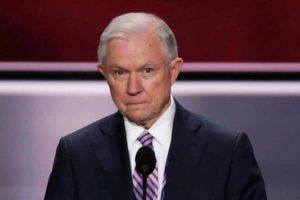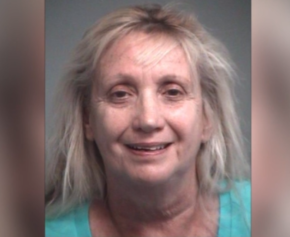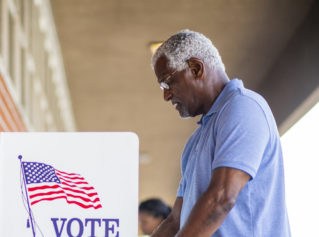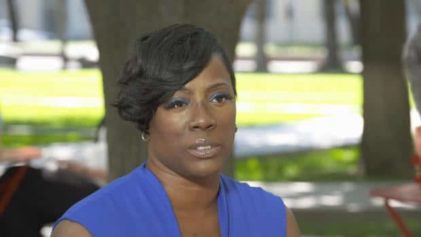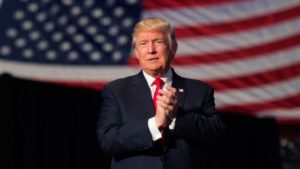
His tweets followed comments he made two days earlier, telling a group of congressional leaders that between 3 to 5 million immigrants illegally voted for Hillary Clinton. Trump has been citing such nonexistent illegal votes since it became clear that he had lost the popular vote by a huge margin, ultimately close to 3 million votes.
Trump’s claims are completely without merit. In attempting to defend Trump’s voter fraud lie, Sean Spicer made reference to a nonexistent Pew Research Center study, causing the author of the most recent Pew study on the topic to retort through tweet, “I’m aware of no Pew report, including the ones I wrote when I was there, which support any findings of voter fraud.” Moreover, the organization representing the chief election officials in all 50 states issued a press release stating, “We are not aware of any evidence that supports the voter fraud claims made by President Trump.”
Trump’s tweets and remarks about voting over the past few days reveal that he is remarkably insecure about losing the popular vote. This has led some pundits to focus on Trump’s mental state, his obsession to prove his legitimacy and the troubling nature of his belief in “alternative facts.” However, such a focus misses the more important point: Through his voter fraud propaganda, Trump has laid the ground work for widening and deepening current voter-suppression efforts.
Even before Trump’s announcement regarding investigations, Bernie Sanders recognized the true impact of Trump’s comments. “What I fear about that statement … [is that] he is sending a message to every Republican governor in this country to go forward with voter suppression,” Sanders said. His concerns were echoed by Rep. Elijah Cummings, who stated during a Morning Joe interview (see 2:00 mark), “The thing that I worry about with this argument about voter fraud is it gives the Republicans and others another tool and another reason to justify to the public, denying people the right to vote.”
Sanders and Cummings are absolutely correct. Trump has sent a clear message that he values the fight against imaginary voter fraud over the need for voting rights.
Trump’s reference to voters registered to vote in two states is particularly ominous. Months before the election, Rolling Stone reporter Greg Palast warned about the Interstate Voter Registration Crosscheck Program (Crosscheck), a Republican plan that may have resulted in hundreds of thousands, if not millions, of voters being removed from voter lists. Crosscheck checks voter files in participating states comparing voters first and last names across states. If it finds matching information in different states, a “red flag” goes up and those people may become targets for being expelled from voter rolls, although there are many reasons why people may still be registered in more than one state. Coincidentally, just hours after Trump’s tweet on this issue, NBC News reported that his chief strategist, Steve Bannon, was registered to vote in two states during the November election and up until this week. MSNBC later revealed that Trump’s youngest daughter, as well as his Treasury Secretary nominee, are both registered in two states. Few in the mainstream media have paid any attention to this issue, but judging from his tweet, Trump has. If we aren’t vigilant, we could see an expansion of the Crosscheck program in future elections.
In Republican-controlled states, people of color have been targeted for removal at a higher rate than white voters. In North Carolina and elsewhere, the GOP has targeted Black voters “with surgical precision” causing speculation that voter suppression has already worked to lower turnout among Black and Latino voters, down slightly in 2016.
ThinkProgress recently reported on the effectiveness of voter restrictions in three key states: Florida, North Carolina and Wisconsin. In Wisconsin, where Trump”s margin of victory was 30,000 votes, “as many as 300,000 people lacked the proper ID and may have been disenfranchised.” The state’s new voter ID law resulted in its lowest presidential year turnout in two decades. Similar restrictions produced similar results in Florida and North Carolina.
And yet, very little post-election analysis has focused on the fact that this was the first presidential election since the Supreme Court’s gutting of the Voting Rights Act. Instead, other issues has been explored, from Russian hacking and FBI impropriety to Clinton’s campaign mistakes and, of course, the poor misunderstood white working class.
The Brennan Center for Justice predicts that more voter suppression is on the way. According to its preview of 2017 state-level legislative action, “at least 33 bills to restrict access to registration and voting have been introduced in 16 states.”
Where will the Trump Administration stand on such voter suppression efforts? Even before his comments over the past few days, Trump had already taken steps indicating his Department of Justice will prioritize state’s rights over voting rights. In fact, it started on Inauguration Day. As many progressives were enjoying social media photos documenting the inauguration’s low attendance, Trump’s DOJ filed a motion in federal court seeking to delay a case challenging the legality of Texas restrictive voter ID law. Under Obama, the DOJ was challenging the law, but the Trump team may change its position.
Later that day, it became known that Trump was appointing John Gore to lead the DOJ’s Civil Rights Division. Unfortunately, Gore has become famous for defending states accused of violating civil rights, particularly voting rights. As New York magazine observed, “He appears far better prepared to rationalize the GOP’s state-level voting restrictions than to contest them.”
Thus, what is developing right in front of our eyes is a two-prong attack on voting rights. Trump is encouraging states to expand voter suppression, while simultaneously eliminating any federal oversight.
And Trump has selected the perfect general to wage this war — Attorney General, that is. Jeff Sessions became famous in 1985 when he prosecuted three voting rights activists for the alleged crime of voter fraud. One of the three activists, Albert Turner, Sr., had worked closely with Dr. King during the Voting Rights Movement. In fact, in 1965 when marchers confronted state troopers in Selma, Alabama, on Bloody Sunday, Albert Turner, Sr. was in the second row, right behind Rev. Hosea Williams and John Lewis.
Sessions accused Turner, his wife, Evelyn Turner, and Spencer Hogue of manipulating absentee ballots as they assisted elderly and illiterate voters. Of course, the charges were completely false, and it took a jury less than three hours to acquit the Marion Three. However, in the meantime, Sessions had led an investigation that included the interrogation and intimidation of voters as well as community organizers.
Simultaneously, Sessions became the darling of the conservative movement against voting rights. He gained the attention of President Ronald Reagan, who did not hesitate to nominate Sessions for a federal judgeship. Although he could not gain confirmation, Sessions managed to ride his newfound prominence to the Alabama Attorney General’s office, a U.S. Senate seat, and his current nomination to become U.S. Attorney General.
Thus, a man whose entire political career was literally built on the backs of Black voters and scurrilous claims of voter fraud, is about to be empowered by an ‘authoritarian’ president who shares his thirst for restricting voting rights.
In 2013, when the Supreme Court weakened the Voting Rights Act, Sessions called it “good news … for the South.” During his confirmation hearing two weeks ago, Sessions repeated his opinion that the Voting Rights Act is “intrusive,” and he stated that he doesn’t see a problem with Voter ID laws.
So, when Donald Trump calls for an investigation into voter fraud, we must all be clear: He is not just a desperate, insecure man living in his own reality. He knows exactly what he’s doing and he knows exactly who he wants to carry out his vision.
We don’t have time to laugh at Trump on social media. If we do, by the time we finish laughing, the joke will be on us.
